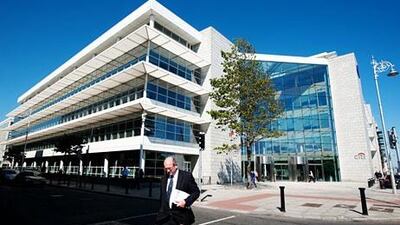Ireland has been the home to foreign banks, insurers and investment funds for decades, but the country started making a concerted pitch to foreign financial companies only in the 1980s, when its International Financial Services Centre (IFSC) was launched.
Abu Dhabi Model Economies: More on the 2030 vision
Abu Dhabi eyes Irish lessons for its vision Ireland's economy has taken a beating during the financial crisis, but the country's development model is still one Abu Dhabi and other Gulf countries are looking at carefully. read article
How to impress a client - have the PM speak on your behalf Ireland has put huge amounts of money and effort behind growing its small businesses. The government-led push has helped make thousands of homegrown companies successful and given them a lasting foothold in the global economy. Read article
Among Europe's elite for research Ireland has put considerable financial muscle behind raising its science and innovation profile in Europe, which has vaulted the small country into Europe's top leagues. read article
In 1987, the government unveiled a raft of incentives to speed along the redevelopment of Dublin's decaying dockyards into the new IFSC.
The bait included a 10 per cent tax rate, favourable development terms and the promise of cheap transactions with the rest of Europe - one crucial benefit of Ireland's accession to the EU in the 1970s.
"This whole area was developed, the idea being to create a cluster of financial services companies creating this community that would attract more companies to the centre and generate more activity in the centre," says Tom Woods, a partner in KPMG's business in Ireland. "That actually is what happened."
Much has changed since the 1980s and the mood certainly soured when Ireland's banks went belly-up in the wake of the financial crisis. But the IFSC remains a thriving centre, and stands as perhaps a textbook example of how to make a financial hub work.
More than 20,000 people work within the IFSC's bounds, and more than half of the world's top 50 financial companies have offices there.
Ireland's centre worked both because of the government's commitment and the unusually open nature of the Irish economy, executives say. Because it was so cheap to process transactions in Ireland, many banks and fund managers quickly set up treasury operations and payment processing centres in the early days.
Those back-office operations are still commonplace in the IFSC, but financial companies have more recently switched focus to higher-value investment banking and research.
While Ireland was attractive at first because of its low costs, the country long ago lost its place as one of the cheapest places to do customer services and transactions, forcing banks and investment companies to adapt.
"We said the low-cost thing is not going to last forever," says Colin Moreland, the managing director and treasurer of Citibank's Irish bank. "We said, we're not going to survive if we stay doing the basics we were doing at that point in time."
In response to those changes, Citi set up a local Irish bank in 2001. The goal was to do more profitable business out of Ireland, hoping that the executives back in New York would see the country as a sound place to continue making investments.
The following year, Citi started selling its WorldLink payments processing product from its new headquarters in the IFSC to 108 countries. It added a range of transactions products to its arsenal in subsequent years.
"We've now got over 20 of the global transactions services products based in Ireland, managed in Ireland and sold all over the world," Mr Moreland says. "That has meant a lot of product jobs have come with it. A lot more senior management is here than would have been in the early 2000s."
* Asa Fitch

